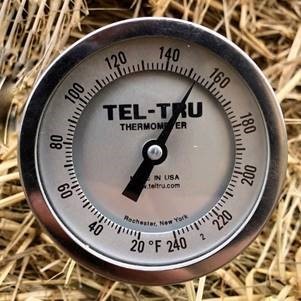The Importance of Hay Moisture
Amy Barkley, Team Leader & Livestock Specialist
Southwest New York Dairy, Livestock and Field Crops Program
The Importance of Hay Moisture
Paul Vining, OSU Department of Animal and Food Sciences Graduate Research Assistant
Cutting and bailing hay sometimes becomes a "hurry up and wait" process, while waiting on passing rain showers. Hay should be baled when it has dried to the point of containing approximately 14-18% moisture. Bailing hay that contains elevated moisture may lead to an excessive amount of heat and possibly combustion then fire. Excessive moisture content allows for increased growth of bacteria and fungi. The presence of oxygen causes these microorganisms to go through chemical reactions which release heat. This continuous heat release increases hay bale temperature, which causes a risk of combustion and the possibility of fire. Even when fire is avoided excessive moisture content will cause a substantial loss of dry matter and decrease hay quality.
Hay Temperature and Fire Risk
If hay must be baled during unfavorable conditions a hay thermometer (36-inch compost thermometer) is a useful tool for measuring hay bale temperature. If hay reaches an internal temperature of approximately 135ᵒF, it is recommended to remove it from the barn. For these suspect bales, check the temperature twice per day and do not place the bales back inside the barn until the temperature has fallen to at least 120ᵒF.

Image. Hay Thermometer Indicating Elevated Bale Temperature
Increased Hay Moisture Content Leads to Decreased Hay Quality
Elevated hay moisture levels (>18%) will decrease hay quality. Hay bales go through a "sweat" following cutting and baling. During this period heat is generated by the increased activity of microorganisms that consume forage sugar and starch. Increased hay moisture content allows for an increase in microbial activity, leading to greater consumption of forage nutrients and a reduction in forage quality. A study conducted at the University of Kentucky evaluated the daily hay temperature and ambient temperatures of two cuttings of alfalfa. The fall cutting was baled at 20% moisture and the spring cutting was baled at 16% moisture. The spring cutting, baled at 16% moisture slowly increased in temperature for 20 days after baling but never reached 120ᵒF. The fall cutting (20% moisture) spiked to 140ᵒF 3 days after baling and returned to a baseline temperature around day 8. The initial spike in temperature for the fall cutting due to increased moisture content would have caused a reduction in forage quality.
Hay does not have to be bone dry to make quality hay without risk of hay fire or heat damage to nutritive quality. Baling excessively dry hay makes bales with low density and contributes to loss of leaves and quality losses. But when moisture is too high, spontaneous heating is problematic for hay quality and risk of hay fires.
Reference
Hancock, D.W. 2012. HAY MOISTURE: HOW DRY IS DRY ENOUGH? Hay & Forage Grower. The University of Georgia. https://georgiaforages.caes.uga.edu HFG1306
Upcoming Events
NYSDEC How to Get Certified Course
March 3, 2026 : NYSDEC How to Get Certified Course
Ellicottville, NY
NYSDEC training course in preparation to take the pesticide applicator exam.
From Data to Dollars: Making Data-driven Decisions to Increase Farmers Market Success
March 3, 2026
The Cornell Agricultural Marketing Research Program and Penn State University are excited to present this new, 6-week course as part of Cornell's Farmers Market Research Project. The course is for farmers with experience selling at farmers markets who wish to increase their earnings through management and marketing practices.
Cornell Organic Field Crops & Dairy Conference
March 6, 2026
Waterloo, NY
Farmers, researchers, educators, and agricultural service providers from across the Northeast are invited to the 2026 Cornell Organic Field Crops & Dairy Conference, held Friday, March 6, 2026, from 8:00 a.m. to 4:30 p.m. at the Lux Hotel & Conference Center in Waterloo, N.Y.
Co-hosted by New York Soil Health and Cornell CALS, the annual conference brings together leaders in organic grain, dairy, and livestock systems to share practical tools, new research, and farmer-tested strategies to support resilient and profitable organic production.
Announcements
Cows, Crops & Critters Newsletter Sponsorship
TRYING TO REACH GROWERS AND AGRIBUSINESSES IN OUR SOUTHWEST REGION OF NEW YORK?Weekly Email Update: Shared with 625+ households who have signed up with our program.
Monthly Paper Mailer: To reach our stakeholders and farmers who lack internet access, we send out a monthly mailer where your company's logo and contact information would be featured with a mailing list of 330+ households.
If you sponsor our weekly and monthly publications you reach approximately 955 households.





